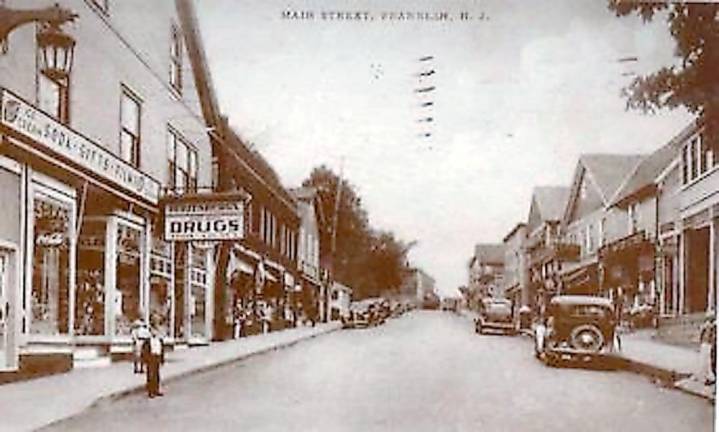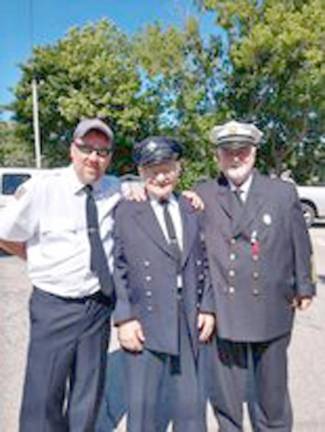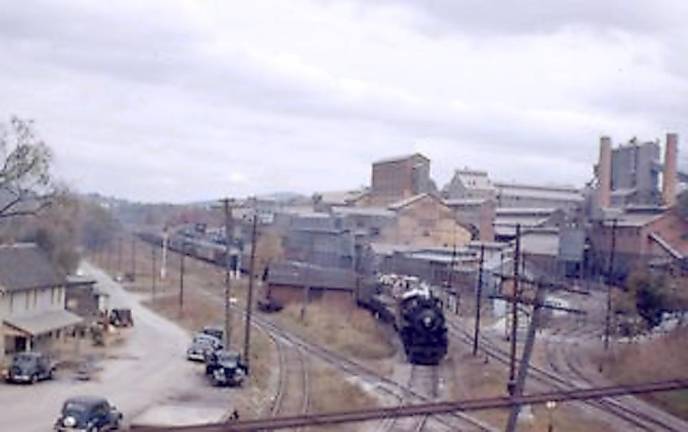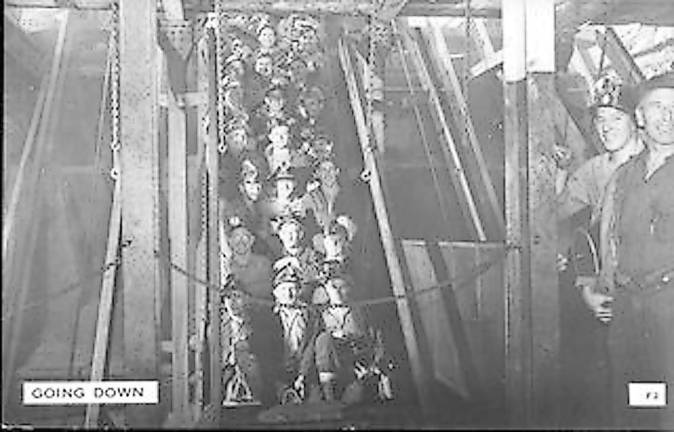History to bolster Franklin’s resurgence
Franklin. The borough’s once-booming downtown is ready to flourish once again.




Franklin was once home to a booming mining business underground while on the surface, a tight-knit, multi-cultural community bustled on Main Street and at its beloved Neighborhood House. Now, Franklin-loving folks are coming together to revive its history and renovate its downtown.
All of the ore had been taken from the ground by 1954. The Franklin Borough historian, Phil Crabb, said the miners who made the final blast had tears in their eyes when all it revealed was a white marble wall. The zinc was gone.
“It was a geological phenomenon,” Crabb said. “It was a pod of zinc and then nothing on the sides around it.”
Businesses started to migrate from Main Street to the new Route 23. The Neighborhood House was demolished, and the Hungarian church was moved from Evans Street to its present site on Main Street.
“Growing up here, I can attest to the fact that our Main Street was second-to-none in the county,” said local business owner John Postas. “My whole goal with this is to bring it back to what it once was. My family has been in town since 1903.”
Postas’ great-grandfather came from Hungary to work for the New Jersey Zinc Company. Postas’ grandfather opened a barber shop in 1925. His father chose accounting over barbering, so the shop was handed down to Postas by his grandfather. Postas Barbershop continues to prosper on Rutherford Avenue.
“The idea here is that Franklin has so much history with the mining but also so many cultural aspects of it,” Crabb said. “I was born two years after the mine closed, but we all grew up saying greetings in five different languages, although you had to be from Franklin to pronounce the dialect. When I was about three my grandfather ran the BD Simmons Coal and Lumber Company. I remember then how orderly and how vibrant Main Street was back then in 1959.”
Franklin Pond also has its history. Back in the day, the pond had two rights of passage, Crabb said — “when you were first pushed off the high dive, and when you went under the ropes to swim out to the dock.”
Renovating Franklin
A group including Crabb and Postas, Franklin Mayor John Sowden, county historian Bill Truran, the Franklin Borough Historical Commission, the town, and others want to see Franklin’s Main Street, mining buildings, and Franklin Pond return to their glory days.
“We’ve been working with the State Historic Preservation Organization, and Franklin meets all of the parameters to qualify for historic preservation,” Postas said. “Most towns in the state meet some but not all, so this is very rare.”
This distinction will allow the town to apply for restoration grants.
“The state said that we do have some real historically relevant things dating roughly between 1765 to 1954 that meets all the criteria state has to designate as historical,” said Sowden. “There’s a lot to be very proud of here.”
The Historic Main Street Redevelopment Plan, posted on FranklinBorough.org, says it is “the culmination of many years of study and discussion about the future of Main Street and its environs. A particularly important component of the Plan involves the former Zinc Mine Company property, which is in close proximity to Main St.. The Plan builds on previous planning documents, as well as new thoughts and ideas by the current Planning Board. The Plan also references the well known revitalization approach of the National Main Street Center, which advocates four important principles necessary for any revitalization effort — Organization, Design, Economic Restructuring and Promotion.”
Mayor Sowden said that this plan, which was posted in 2018, will be “worked on and updated” shortly because they want to move forward with the restorations.
Crabb sees the Hungarian church being turned into a welcome center. “It would be the first place people would go when they came to town,” he said.
One of the hopes of the restoration effort is to recreate a community center such as the once-popular Neighborhood House. Crabb believes the old Change House would have sufficient space for this.
Michael’s Jewelers has been located on Main Street for 60 years and has established a prestigious reputation. Despite Covid, businesses that have opened on Main Street are doing just fine. Franklin Rock, Mineral and Gem opened six months before the pandemic, and Sugar Sisters, which sells baking supplies, is doing great. Tab’s Hideaway features all kinds of finds. Markorama Games and Hobby sells games like Dungeons and Dragons.
Residents and business owners are all for the renovations, including Tabatha Ressler, a Franklin resident who took a chance on Main Street and opened Tab’s Hideaway there three months ago. “I agree 100 percent that it’s time to restore Main Street,” she said. “Franklin doesn’t have the best reputation on Main Street, but as places continue to open, it will put a positive spin on the area.”
She agrees that creating a new community center would greatly benefit the town. “There’s not much for kids to do around here, so it would be a place where they could go, keep busy, keep occupied, socialize and stay out of trouble,” Ressler said. “I have an 11-year-old son, and having a community center back in town would be great.”
“We need to capitalize on the history of this town,” Postas said. “Most years, we’ll have 1,000 to 1,500 people come here for our mineral show because Franklin is the Fluorescent Mineral Capital of the World. We want people to take pride in this town and what we have. People come from all over to see our fluorescent minerals, yet many who live here don’t know about them.”
Remembering the past
Crabb said the Franklin Borough Historical Commission is not only helping with renovations but making sure that history stays alive and accurate. To this end, the commission has started a program called “Growing Up in Franklin.” It kicked off on Nov. 1 when resident Crabb said Eddie Mindlin, who is in his 90s, regaled a group at Postas Barbershop with his “incredible, some truly remarkable, anecdotes about growing up in Franklin Borough.”
“If nothing else this first session presented a clear depiction of how large a role that our various immigrant cultures had in creating the success story of this unique and noble town,” Crabb said. “The session was covered by a trained documentation and was recorded by video and quality audio. I cannot adequately express how much discovery has come so far as a result of this session with a most incredible man who literally bridges back to that time we have all heard about, and see on these pages. And, we have more to cover.”
This program will provide insights into the borough’s past and a description of exactly how the town used to be.
“Eddie and others who remember the past can take us on a tour of Main Street and tell us the pedigree of each of these businesses,” Crabb said. “You’d never know his age. He’s vibrant and has so many memories and stories.”
Crabb even has a photo of Mindlin from 1943 when he was part of the undefeated Franklin High School Baseball Team.
“Here is a guy from 85 years ago that walks and talks among us,” Crabb said. “He’s the window that allows us to time travel and that’s why we wanted to get him recorded. We formed this historical commission so that people would have an appreciation for what their assets are. We were the world’s largest zinc mine, we have amazing florescent minerals on display at our museum. If you knew where to walk in town today, you could pick up a rock and sell it on Ebay. In the geological world, we’re their Disney, and geologists actually plan their vacations around coming here. We are, at the very heart, a town where cultures melded to create an incredible community.”
Crabb said the ball is rolling toward renovations and historical documentation. “We are putting together a historical document that is really going to be the ‘Bible’ of the history of Franklin going forward,” he said. “We want to make sure it’s completely accurate to portray what the town was in the past to future generations. Without complete accuracy, it’s a train going off the track.”
Moving forward
Main Street still has all of the infrastructure, Crabb said — “store fronts that come out to the sidewalk. Some partially or completely converted to apartments. The old company store is still there and so is the Franklin Theater. We still have the anchors.”
“We put a beach back in at Franklin Pond,” Postas said. “There is more we can do there too.”
Once the pandemic has left, one idea is to bring back the swim team, another to possibly add little pedal boats, and a third to possibly bring back a snack stand. As for the mine, converting the Change House into a community center would both allow people to gather for recreation and enjoy Franklin’s rich history.
Franklin Borough and its Main Street have survived world wars, the Great Depression, and now a pandemic. It’s time to flourish once again.
To donated artifacts to the Borough of Franklin, to get questions answered, or to share stories from the past (especially from those who have since moved away), contact the Franklin Borough Historical Commission, c/o Franklin Borough Hall, 46 Main St. , Franklin, NJ 07416.
Editor’s note: Thank you to reader Alana Steib of Stockholm, who offered a correction to this story: “Just read your lovely history of Franklin. I really enjoyed it. One correction! The Neighborhood House on Main Street was not demolished in 1954! It had a useful lifespan well after 1954, with the first floor being a dance studio, and the second floor being the home of Senior Legal Resource Center, The Help Line, and The Samaritan Inn. It was also open to the community as a meeting space for the Girl Scouts and other local organizations. Neighborhood House also was the site of a Memorial Garden to David Hertzenberg, the founder of the Senior Legal Resource Center. So it was a vital contribution to the life of Main Street far beyond 1954.” The paper regrets the error.
“It is critical for all of us, to lock the memories of this unique life we lived before they are lost forever. We, arguably, are the last stand...the last to accurately relate the upbringing that only we who grew up here understand.” Phil Crabb, Franklin Borough Historian